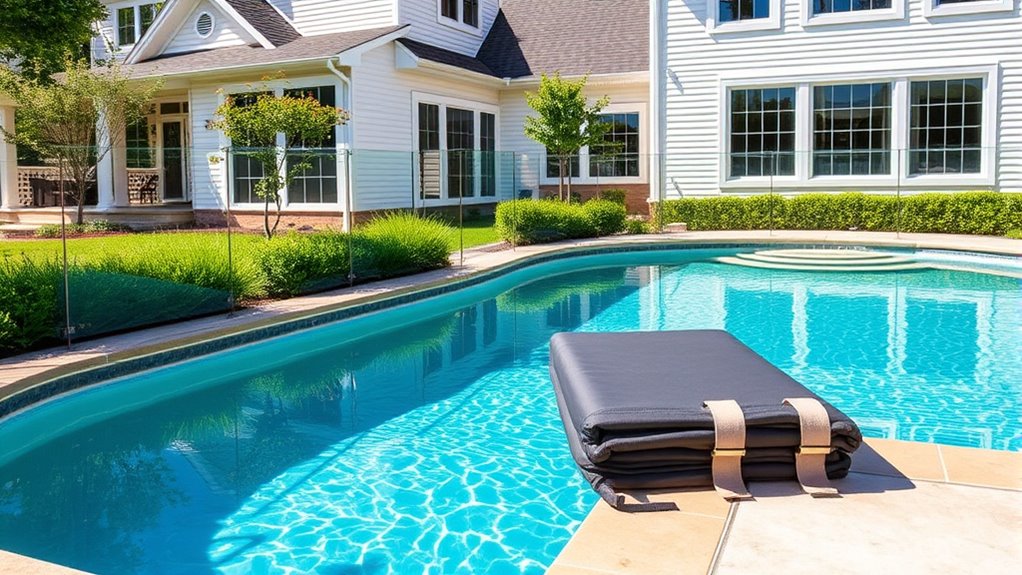Liability insurance is essential for protecting you from financial risks linked to your home pool. It covers injuries, property damage, and legal expenses if someone gets hurt, helping you avoid paying out of pocket. Even if you have safety measures like fencing and alarms, gaps in your existing coverage can still leave you vulnerable. To better understand how to secure your pool and peace of mind, keep exploring what options are available.
Key Takeaways
- Liability insurance protects against injury or property damage claims related to your pool, covering legal fees and settlements.
- Review and possibly increase your existing homeowners policy limits or add umbrella coverage for comprehensive protection.
- Installing safety features like fencing, alarms, and covers can lower premiums and demonstrate responsible ownership to insurers.
- Proper insurance coverage helps cover legal expenses and medical bills if someone is injured in your pool area due to negligence.
- Regularly verify your policy details and consult with an agent to ensure all pool-related risks are adequately covered.

Having a home pool can be a great way to enjoy the summer, but it also brings significant liability risks. When you own a pool, safety should be your top priority. Proper pool safety measures, like installing fencing, pool covers, and alarms, help prevent accidents and protect you from legal and financial consequences. But even with these precautions, accidents can still happen. That’s where insurance coverage becomes essential. Ensuring you have the right liability insurance for your home pool can provide peace of mind, knowing you’re protected if someone gets injured or if there’s property damage.
Liability insurance is designed to cover costs related to injuries or damages caused by your pool. Without it, you could be personally responsible for medical bills, legal fees, or damages awarded in a lawsuit. Many standard homeowners insurance policies include some liability protection, but it’s important to review your policy carefully. Sometimes, your existing coverage might not be enough to fully protect you if a serious accident occurs. You might need to increase your liability limits or purchase additional umbrella insurance to extend your protection beyond your home’s primary policy. It’s a smart move to discuss your specific needs with your insurance agent, especially if your policy doesn’t explicitly mention pools or if your pool is particularly large or in-ground.
Pool safety isn’t just about physical barriers and supervision—it also influences your insurance coverage. Insurance providers often look favorably on homeowners who implement strict safety measures, which can sometimes lead to lower premiums or better policy terms. Conversely, neglecting safety protocols can increase your risk of claims and might even lead to policy denial in certain cases. Maintaining safety standards demonstrates responsible ownership and reduces the likelihood of accidents that could trigger insurance claims.
You should also be aware of the legal liabilities associated with pool ownership. If someone gets injured in your pool area, you could be held liable, especially if negligence played a role. That’s why having exhaustive insurance coverage is critical. It helps cover legal expenses, settlement costs, and medical bills, so you’re not personally footing the bill. Additionally, check whether your policy covers related incidents, such as injuries from diving board accidents or slip-and-fall incidents on your property. Understanding the specific liability coverage limits in your policy is crucial to ensure adequate protection.
Frequently Asked Questions
Does Liability Insurance Cover Pool-Related Injuries to Trespassers?
Liability insurance generally doesn’t cover drownings liability or trespasser injuries, especially if the trespasser intentionally enters your property. If someone is injured or drowns while trespassing, your policy might exclude coverage. To protect yourself, consider discussing specific coverage options with your insurer. Keep your pool secure to minimize trespasser injuries, and understand that liability insurance may not fully cover accidents involving trespassers.
Are There Specific Policy Exclusions for Home Pools?
Yes, many liability policies exclude coverage for injuries related to unprotected pools without proper safety measures like pool fencing or covers. Insurers often specify that if you lack adequate pool fencing or fail to use safe pool covers, your policy might deny claims related to pool accidents. To avoid surprises, verify your policy clearly outlines these exclusions and maintains proper safety features to safeguard both your family and your coverage.
How Does Liability Insurance Differ From Pool-Specific Coverage?
Liability insurance covers general risks like injuries or property damage related to your pool, but it doesn’t specifically include pool accessories or maintenance tools. Pool-specific coverage, on the other hand, offers extra protection for pool accessories, equipment, and maintenance-related incidents. If you want thorough protection, consider adding pool-specific coverage to guarantee your pool accessories and maintenance activities are fully covered, minimizing out-of-pocket costs if accidents happen.
What Safety Features Can Reduce Insurance Premiums?
Installing safety features like pool fencing and safety covers can lower your insurance premiums. Pool fencing creates a barrier that prevents accidental access, reducing risk, while safety covers protect swimmers when the pool isn’t in use. By adding these features, you demonstrate your commitment to safety, which insurers recognize, often leading to discounts. Make sure your fencing is compliant with local codes, and regularly maintain safety covers for maximum benefit.
Is Liability Insurance Mandatory for Private Pool Owners?
Liability insurance isn’t always mandatory for private pool owners, but it’s highly recommended to safeguard you from potential legal and financial risks. Pool safety measures, like secure fencing and covers, can lower your insurance costs, but they don’t eliminate the need for liability coverage. Having proper liability insurance ensures you’re covered if someone gets injured on your property, giving you peace of mind and protecting your finances.
Conclusion
In short, understanding liability insurance is essential if you own a home pool. It shields you from unexpected accidents and legal troubles, giving you peace of mind—like having a trusty steed in your backyard. Remember, pool safety and proper coverage go hand in hand. Don’t let a mishap turn your summer fun into a legal quagmire. Stay protected, stay prepared, and enjoy your pool days without worry.









